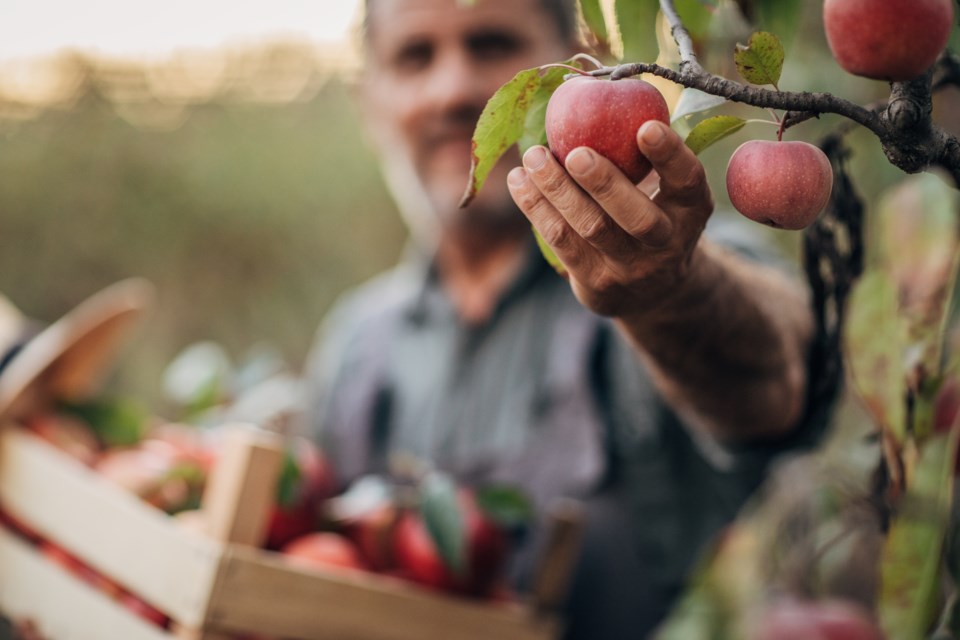As I write this, the sun casts a harsh glare on my orchard outside my window. The same sun that once nurtured our fruit trees now threatens their survival. Our family farmers—the backbone of British Columbia’s tree fruit industry—are in the throes of a crisis that demands immediate attention.
Over the past four years, our orchards have been subjected to relentless climate events. Scorching heatwaves, unprecedented deep freezes and hailstorms have battered our trees. Blossoms wither, young fruit shrivels and hope fades. Our once-thriving orchards now resemble a battlefield.
The joy of biting into a crisp apple picked from a local orchard, or the delight of a sweet cherry fresh off the tree, are experiences woven into the fabric of our lives. These moments, made possible by the tireless efforts of our family farmers, are at risk. Without action, the livelihoods of our farmers and the entire B.C. fruit industry could wither away. Just this week the BC Tree Fruits Cooperative, a co-operative that has been around for 88 years, has shut down and I fear this is only the beginning.
We cannot afford to wait. Our farmers will not survive another five-year replanting program. As it is currently proposed, the replant program will not cover the true cost of planting, labour, irrigation or the loss of revenue for the years it will take orchards to grow and start producing fruit. Investment needs to be made by the provincial and federal governments to support the full replant cycle. Without that support, the damage will be irreversible, and our farms will close.
The replant program is just one tool to help tree fruit farmers. The government must step up emergency relief. This is not a luxury—it is a lifeline. We only need to look south to our neighbouring farmers in Washington state to see the difference a presidential disaster declaration can make in providing emergency credits to producers recovering from natural disasters.
The provincial government needs to create a Horticulture Climate Disaster Recovery and Resiliency Fund to provide adequate financial relief after extreme weather events. Immediate relief is also needed through a one-time stabilization fund to ensure the future of B.C.’s fruit industry. Our farmers in B.C. need direct financial and policy support to weather this storm now, before it’s too late to save our once thriving sector.
Long-term planning is also crucial. Let’s invest in research into climate resilient practices: Drought-resistant varieties, precision irrigation and soil health management can make our orchards more resilient. There needs to be meaningful changes to business risk management programs to support the new climate realities of successive years of growing loss.
There is also the issue of imports from Washington state. Canada and, by extension, B.C., continually allow Washington state to export their apples into Canada without any duties or tariffs. Agriculture is heavily subsidized in Washington state to the tune of billions of dollars, and this directly allow farmers from the U.S. to undercut local B.C. farmers.
Lastly, farmers deserve to be paid fairly for their crops. BC Tree Fruit farmers are receiving less per pound of crop grown even though grocery stores continue to make record-breaking profits. Those record returns do not make their way back to the farmer who faces increasing costs of production and the added costs of climate change.
Every British Columbian benefits from the province’s agricultural output. They benefit in dollars, in nutrition, in food security and in the global benefit of being a positive food producer. British Columbia is, in many ways, defined by our agricultural products. Apples, peaches and cherries from B.C. are known all throughout the world. It’s time we start investing to protect the future of food production in British Columbia.
Our orchards are more than economic assets; they are part of our cultural fabric. Let’s rally together, demand action, and ensure that the sweet taste of B.C.’s tree fruits graces our tables for generations to come.
Peter Simonsen is president of the BC Fruit Growers’ Association, established in 1889.




